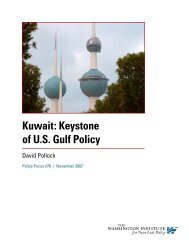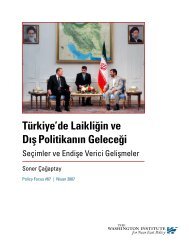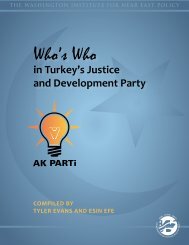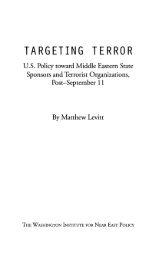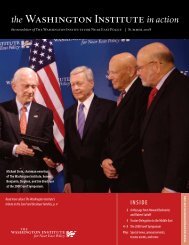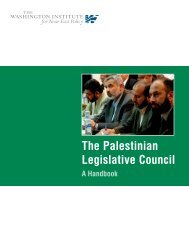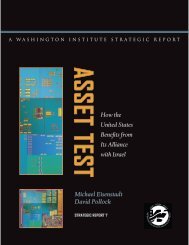alternative foreign policy views among the iranian policy elite
alternative foreign policy views among the iranian policy elite
alternative foreign policy views among the iranian policy elite
You also want an ePaper? Increase the reach of your titles
YUMPU automatically turns print PDFs into web optimized ePapers that Google loves.
28 IRAN'S STRATEGIC INTENTIONSI should emphasize that <strong>the</strong> Clinton administration is notopposed to Islamic government in Iran. Indeed, we haveexcellent relations with a number of Islamic governments.Ra<strong>the</strong>r, we are firmly opposed to <strong>the</strong>se specific aspects of <strong>the</strong>Iranian regime's behavior, as well as its abuse of <strong>the</strong> humanrights of <strong>the</strong> Iranian people. We do not seek a confrontation,but we will not normalize relations with Iran until and unlessIran's policies change, across <strong>the</strong> board.There are some contrary voices, who suggest that Iranianbehavior is not likely to change. Their argument is madestronger by <strong>the</strong> frequent dashing of hopes that moderates wouldconsolidate power and change <strong>policy</strong>--a hope first held out inDecember 1979 when <strong>the</strong> election of Bani Sadr as president wassaid to foreshadow release of <strong>the</strong> American embassy hostages,and <strong>the</strong>n repeated regularly with each twist and tum of Iranianpolitics. Talk of Iranian moderates has been unpopular <strong>among</strong>U.S. politicians since <strong>the</strong> days of <strong>the</strong> Iran-Contra affair, in whichPresident Reagan was so badly bumed (<strong>the</strong> release of some U.S.hostages being matched by <strong>the</strong> taking of new ones). SomeEuropeans also express in private <strong>the</strong>ir doubts about Iranianmoderation. In a meeting with U.S. Secretary of State WarrenChristopher, Foreign Minister Claes of Belgium (which <strong>the</strong>n held<strong>the</strong> EC Presidency) was quoted by U.S. officials as saying, "Itwould be a historic mistake" for Europeans to believe <strong>the</strong>y couldcontinue <strong>the</strong> search for Iranian moderates. 3How realistic is <strong>the</strong> assumption that <strong>the</strong> Islamic Republiccould be persuaded to change important aspects of its <strong>foreign</strong><strong>policy</strong>? Surely <strong>the</strong> answer to that question depends not onlyupon what <strong>the</strong> West does, but also upon <strong>the</strong> factors inside Iranthat shape <strong>foreign</strong> l~licy. The aim of this paper is to examineone of <strong>the</strong> most important such factors, namely, <strong>the</strong> attitudes3 New York Times, December 2, 1993.28



